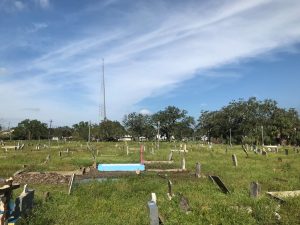A SAD WALK THROUGH A POTTER’S FIELD IN NEW ORLEANS: Part Two
An Excerpt from Persephone’s Underground by Rickey Pittman, Bard of the South
Holt Cemetery
The first thing you notice about New Orleans are the burying grounds – the cemeteries – and they’re a cold proposition, one of the best things there are here. Going by, you try to be as quiet as possible, better to let them sleep. Greek, Roman, sepulchers—palatial mausoleums made to order, phantomesque, signs and symbols of hidden decay—ghosts of women and men who have sinned and who’ve died and are now living in tombs. The past doesn’t pass away so quickly here. You could be dead for a long time.—Bob Dylan
Cora said, “Morticiawill be buried tomorrow in Holt Cemetery.”
Ophelia replied, “Holt Cemetery. Such a sad place—built by the city for the destitute, unclaimed anonymous bodies found in canals and especially for poor blacks. It could be that you and I may find ourselves buried there when we die. Some have described New Orleans as a giant necropolis, a city of the dead. I wish it was that simple.”
When they arrived at the cemetery gate, Ophelia took Cora’s hand, scanned the graves and whispered, “Cemetery, give me passage! Oh, cemetery, open the way!” She tugged Cora’s hand, and they entered the gate and found the grave dug for Morticia. They watched the cemetery workers unload the cheap wooden casket from the Coroner’s transport van, deposit it in the grave, and shovel the dirt onto the casket. When the van left, Cora set a Goth bouquet of red and black flowers on the grave. She tugged on her rosary and said, “Rest in peace, Morticia.”
As they left, Cora thought, This cemetery is nothing like the others in New Orleans. All the graves here are underground. “Look, Ophelia, this cemetery is a jumbled mess. Some sections need mowing.” She picked up a stuffed rabbit lying by a wooden tombstone. The adhesive lettering said the grave was that of a little girl. The thought of a parent having to bury their child in a potter’s field made her sad. Across the cemetery, she noticed a young black mother kneeling by a grave. Her lips were moving as if she were praying. She followed Ophelia to a large, ancient oak in the center of the cemetery, passing homemade shrines strewn with personal items families had left to honor the deceased.
“It’s a miracle this cemetery has lasted this long. It floods during heavy rains, and it reached capacity long ago. It’s still in use, but every time they bury someone, they have to exhume someone. Some graves have been used by one generation for several bodies, one on top of the other. Many buried here died violent deaths, others from drugs or alcohol or natural causes. Certainly, there are lost souls here who will never rest in peace. Some notable people too. Let me show you where a few are buried.” She took Cora by the hand. “Most of these I’m sure you haven’t heard of, but the more you get to know New Orleans, the more you’ll appreciate them.”
She pointed to a gray plaque leaning against the oak. “This is the memorial for Robert Charles, whose act of murder and his death caused the Race Riots of 1900. Ahead are the graves of some New Orleans blues and jazz musicians, popular in their performing days, but forgotten at the end of their life—Babe Stovall, Jessie Hill and Charles “Buddy” Bolden.
“Have you ever heard of them?”
“No,” Cora said, “But I will try to learn about them.”
“Yes, learn about them and listen to their music. They were great musicians, but their burial shows how quickly people can forget. Just think: If you hadn’t come to New Orleans as Cora, you would never have known about them. So many stories are buried here. Ahead, there’s graves for the dead of the Upstairs Lounge. It was a gay club that an arsonist set fire to. And there’s thousands buried here whose stories we will never know.”
“It is indeed a sad place, Ophelia.” She pointed to a brick building. “What is that?”
“It’s an old crematory oven. I suppose because of how crowded the cemetery is, some bodies were cremated and their ashes buried somewhere.”
“It’s full of trash. Only a few graves seem to be cared for.”
“Families are told that they must keep up the graves or the grave is taken over by the city and used for someone else.”
“I didn’t know there was so much history here,” Cora said.
“Yes, there is much history about Holt Cemetery, but it is good for us to remember those buried here, both the nameless and known, and for us to come here to meditate on life and death. And it’s still in operation. Twenty people are buried here each day.”
“I think I will never look at graves the same way after today. Thank you for bringing me here. Maybe I should come here at night? What do you think I would see or hear?”
Ophelia stopped walking and tugged on Cora’s hand. “I came once at night, but I swore I’d never do it again. Get that idea out of your head.”
“Okay,” Cora said, but as she left the cemetery, thinking of her father, she wiped a tear from her eye, kissed her hand, and touched a tombstone that had this inscription:
Just whisper my name in your heart, and I will be there.

